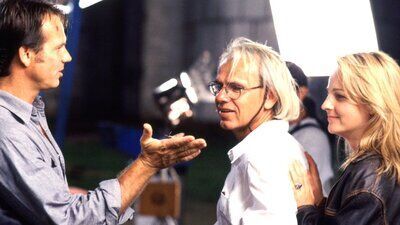 When All the President’s Men was released in 1976, Steven Spielberg was just off his wild success with Jaws and neck-deep in one of his most personal films, Close Encounters of the Third Kind. And while it takes a very skilled director to make those two films, he was likely in no shape to make a politically-charged, subtly-nuanced film like Alan J. Pakula’s masterpiece. But just give him time, because if one wanted to go home and put onAll the President’s Men after seeing The Post, it would barely be any kind of thematic bump. Only the faces would be different. The Post is as politically-charged and urgent as Steven Spielberg gets.
When All the President’s Men was released in 1976, Steven Spielberg was just off his wild success with Jaws and neck-deep in one of his most personal films, Close Encounters of the Third Kind. And while it takes a very skilled director to make those two films, he was likely in no shape to make a politically-charged, subtly-nuanced film like Alan J. Pakula’s masterpiece. But just give him time, because if one wanted to go home and put onAll the President’s Men after seeing The Post, it would barely be any kind of thematic bump. Only the faces would be different. The Post is as politically-charged and urgent as Steven Spielberg gets.
In fact, The Post could be seen as a conclusion of a Spielberg Trilogy of sorts – with Lincoln, Bridge of Spies, and The Post, this trilogy is a love letter to the United States Constitution in all its messy, glorious splendor, and of American women and men forging a path to true freedom by taking roads that aren’t easily navigated. It’s complicated, but through the journey true greatness is achieved. Steven Spielberg loves America, and wants what is best for her, and finds stories in our past that illuminate the political present in ways that are as moral and as important as, perhaps, Aesop’s Fables back in the day. The intention is clear – we are in difficult times, but if we stay true to the paths laid out in that living document, we will find ourselves on steadfast ground. There is nobility in The Post that, perhaps, may be too obvious to some, but the point is clear: true democracy is work, and we have to put in the time and the hours. We risk our livelihood, our respect among our peers, maybe even our own safety in doing so, but to do otherwise is a betrayal of everything we stand for.
You don’t get actors like Meryl Streep and Tom Hanks together for something casual or frivolous. And these two aren’t there simply to spout platitudes and political punchlines. No, the wonderful script by Liz Hannah and Josh Singer makes the struggle personal: in the spring of 1971, President Nixon’s Vietnam War is winding down, and the Washington Post’s executive news editor Ben Bradlee (Hanks) knows that the New York Times is working on a story that could expose the Vietnam War, but he can’t seem to get anyone on the record. Katherine Graham (Streep) owns the paper, and is preparing to take it to public auction. With the passing of her husband, Graham is now in charge, a position that, while the Post has been in her life for all her life, puts her in an unfamiliar place. She believes in the news and her paper, but she also doesn’t want to cause irreparable damage to it by exposing it to more scrutiny. While Bradlee is a zealot, he can also be reckless, and there are hundreds of jobs to consider.
But then the New York Times posts the beginning of what comes to be known as the Pentagon Papers, a study commissioned by Robert McNamara (Bruce Greenwood) that exposes the Vietnam War for the lie that it has become. Soon after, the higher courts shut the Times down for revealing classified information, but Bradlee thinks there is a way through the injunction. To that end, reporter Ben Bagdikian (Bob Odenkirk) discovers a source that could take the Post where the Times could not go. But that source, Daniel Ellsberg (Matthew Rhys) puts everyone at the Post at legal risk, and Katherine Graham must make a choice that could potentially put all of them in prison for treason.
We all know both Streep and Hanks are two of our finest living actors, and Hanks takes Bradlee to passionate places with vigor and enthusiasm. But Meryl Streep’s work here is one of her best, and that is saying something. She plays Katherine Graham as vulnerable and still full of grief from the loss of her husband, suddenly thrown into a legal, financial, and ethical whirlwind that would cause weaker vessels to burst. But Bradlee and Graham inspire each other to inner strength – both have blind spots when it comes to their patriotism and their beliefs, and when it is revealed to them both that their faith in government may have been misplaced, and that their duties to the truth were surreptitiously steered away to more comfortable paths, both of them know what is right and what must be done. Both are tested and find themselves in places that they never expected to find themselves.
Spielberg also fills his supporting acting bench with wonderful actors that keep this engine well-oiled. It’s nice to see a Mr. Show reunion here with Bob Odenkirk and David Cross, but what is even better is that Odenkirk gives Ben Bagdikian a tenacity and fervor that makes all this information compelling. Sarah Paulson, Carrie Coon, Brie Larson, Bradley Whitford, Jesse Plemons, and Tracy Letts all are given moments that propel the story forward, and make what could be overly complicated material easy to understand.
But most importantly, Steven Spielberg gives The Post a resolve and a moral stance that cannot be denied in these times. For some, The Post may be a bit on-the-nose in its message, where a more subtle path may have worked just as well. But Spielberg isn’t preaching to the erudite upper crust here. Sometimes the point needs to be made in bold letters, neon, across the billboards of our ideologies for it to get through. When the press is being attacked on all sides, when money and lies trump the truth because the people in power wish it so, and when a complacent people need to be shaken up out of their stupor, a bit of clarity is preferable to restraint. Spielberg leaves it all out on the field with this film, and thank goodness. I don’t know if the people who need to see The Post will ever see it. But for now, flights of fancy can wait; right now we need to be paying attention, and The Post is a steadfast light against the encroaching darkness. Do not miss it.
Read more at http://www.comingsoon.net/movies/reviews/907623-the-post-review#WMxJJIULddDh7kyJ.99






Leave feedback about this